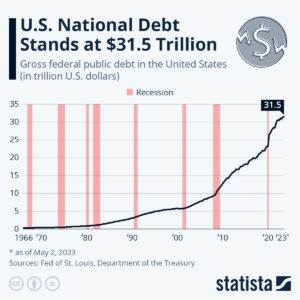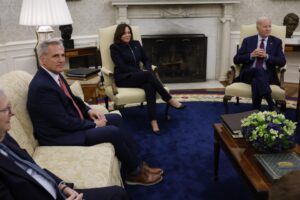
President Joe Biden listens as G7 leaders participate in an event on global infrastructure and investment during the G7 Summit in Hiroshima, Japan, Saturday, May 20, 2023. (AP Photo/Susan Walsh)
The United States has hit its debt ceiling of $31.5 trillion, which has been tripled since 2009, leading to repeated actions on the debt ceiling. The debt ceiling is a congressionally mandated limit on borrowing, which sets a limit on the amount of outstanding federal debt the state can incur.
Raising or abolishing the ceiling has become a contentious issue, with debates over spending and government debt. The issue has become more complicated with a Republican-controlled House and a Democratic President in 2023, resulting in economists warning of catastrophic consequences if outstanding debts are left unpaid. A fight between Republicans and Democrats over the debt limit ceiling could send the U.S. economy into a recession.

The debt crisis in the United States could have severe and long-lasting effects on the global economy. A default on its obligations could cause financial markets to lose faith in the US, leading to a downgrade in credit rating, a weakened dollar, and a fall in stocks. This could cause market turmoil and slow economic growth in other countries.
Even a small country’s debt crisis can have devastating effects on the global economy if it is heavily linked to the global financial system. The 2007-08 global financial crisis was primarily caused by risky lending and derivatives trading in the US, causing a market slump worldwide and a global economic recession.
The US debt crisis could also lead to a possible recession and a credit market freeze, adversely affecting tens of millions of Americans, retirees, veterans, and children. Rising debt can adversely affect the current and subsequent performance of an economy in at least four separate consequences.

Republicans are pressuring President Biden to make steep cuts to government spending as part of negotiations to raise the US borrowing limit. Negotiations have been temporarily paused after House Speaker Kevin McCarthy demanded cuts in government spending. Democrats oppose the measures, and negotiators are looking for a narrow budget cap deal of a few years rather than the decade-long caps Republicans initially wanted, whilst clawing back some $30 billions of unspent COVID-19 funds.
President Biden is urging Republicans to compromise on the issue, warning that the public will hold him responsible for any economic damage caused by a possible default. However, Republicans rejected Democrats’ latest offer, and Biden is starting to play hardball.






